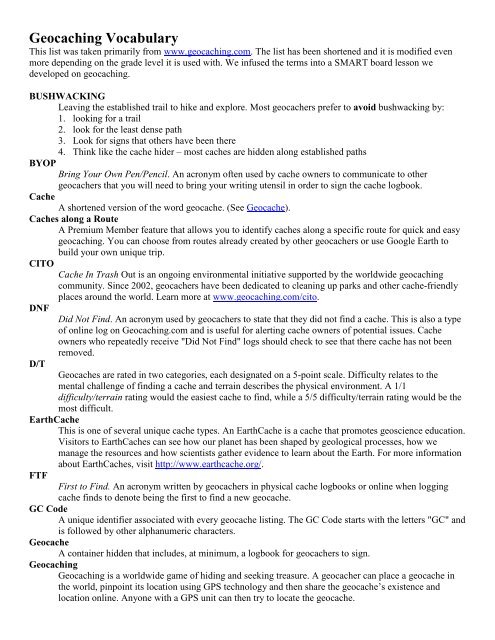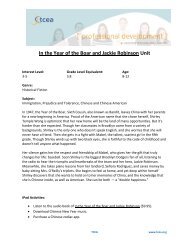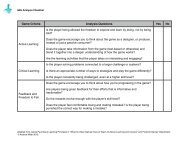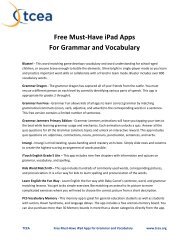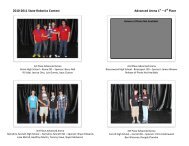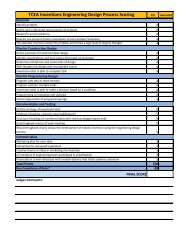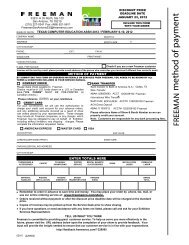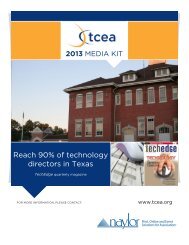Geocaching Vocabulary - TCEA
Geocaching Vocabulary - TCEA
Geocaching Vocabulary - TCEA
Create successful ePaper yourself
Turn your PDF publications into a flip-book with our unique Google optimized e-Paper software.
<strong>Geocaching</strong> <strong>Vocabulary</strong><br />
This list was taken primarily from www.geocaching.com. The list has been shortened and it is modified even<br />
more depending on the grade level it is used with. We infused the terms into a SMART board lesson we<br />
developed on geocaching.<br />
BUSHWACKING<br />
Leaving the established trail to hike and explore. Most geocachers prefer to avoid bushwacking by:<br />
1. looking for a trail<br />
2. look for the least dense path<br />
3. Look for signs that others have been there<br />
4. Think like the cache hider – most caches are hidden along established paths<br />
BYOP<br />
Bring Your Own Pen/Pencil. An acronym often used by cache owners to communicate to other<br />
geocachers that you will need to bring your writing utensil in order to sign the cache logbook.<br />
Cache<br />
A shortened version of the word geocache. (See Geocache).<br />
Caches along a Route<br />
A Premium Member feature that allows you to identify caches along a specific route for quick and easy<br />
geocaching. You can choose from routes already created by other geocachers or use Google Earth to<br />
build your own unique trip.<br />
CITO<br />
Cache In Trash Out is an ongoing environmental initiative supported by the worldwide geocaching<br />
community. Since 2002, geocachers have been dedicated to cleaning up parks and other cache-friendly<br />
places around the world. Learn more at www.geocaching.com/cito.<br />
DNF<br />
Did Not Find. An acronym used by geocachers to state that they did not find a cache. This is also a type<br />
of online log on <strong>Geocaching</strong>.com and is useful for alerting cache owners of potential issues. Cache<br />
owners who repeatedly receive "Did Not Find" logs should check to see that there cache has not been<br />
removed.<br />
D/T<br />
Geocaches are rated in two categories, each designated on a 5-point scale. Difficulty relates to the<br />
mental challenge of finding a cache and terrain describes the physical environment. A 1/1<br />
difficulty/terrain rating would the easiest cache to find, while a 5/5 difficulty/terrain rating would be the<br />
most difficult.<br />
EarthCache<br />
This is one of several unique cache types. An EarthCache is a cache that promotes geoscience education.<br />
Visitors to EarthCaches can see how our planet has been shaped by geological processes, how we<br />
manage the resources and how scientists gather evidence to learn about the Earth. For more information<br />
about EarthCaches, visit http://www.earthcache.org/.<br />
FTF<br />
First to Find. An acronym written by geocachers in physical cache logbooks or online when logging<br />
cache finds to denote being the first to find a new geocache.<br />
GC Code<br />
A unique identifier associated with every geocache listing. The GC Code starts with the letters "GC" and<br />
is followed by other alphanumeric characters.<br />
Geocache<br />
A container hidden that includes, at minimum, a logbook for geocachers to sign.<br />
<strong>Geocaching</strong><br />
<strong>Geocaching</strong> is a worldwide game of hiding and seeking treasure. A geocacher can place a geocache in<br />
the world, pinpoint its location using GPS technology and then share the geocache’s existence and<br />
location online. Anyone with a GPS unit can then try to locate the geocache.
Geocoin<br />
Geocoins work similarly to Groundspeak Travel Bugs ® (see Travel Bugs) in that they are trackable and<br />
can travel the world, picking up stories from geocache to geocache. Geocoins are often created as<br />
signature items by geocachers and can also be used as collectibles.<br />
GPS<br />
GPS stands for Global Positioning System. It is a system of satellites that work with a GPS receiver to<br />
determine your location on the planet. For more information on GPS, FAQs.<br />
Ground Zero (GZ)<br />
The point where your GPS device shows that you have reached the cache location. At Ground Zero, you<br />
are zero feet (or zero meters) away from your destination.<br />
Hitchhiker<br />
A hitchhiker is an item that is placed in a cache, and has instructions to travel to other caches.<br />
Sometimes they have logbooks attached so you can log their travels. A Travel Bug is an example of a<br />
hitchhiker.<br />
Latitude<br />
Latitude and longitude create a waypoint. Latitude is the angular distance north or south from the earth's<br />
equator measured through 90 degrees. (Listen to this mp3 for an entertaining way to learn about<br />
longitude and latitude (thanks to ACME)).<br />
Longitude<br />
Latitude and longitude create a waypoint. Longitude is the angular distance measured on a great circle of<br />
reference from the intersection of the adopted zero meridian with this reference circle to the similar<br />
intersection of the meridian passing through the object. (Listen to this mp3 for an entertaining and nontechnical<br />
way to learn about longitude and latitude (thanks to ACME)).<br />
Muggle<br />
A non-geocacher. Based on "Muggle" from the Harry Potter series, which is a non-magical person.<br />
Usually this term is used after a non geocacher looks puzzled after befriending a geocacher searching for<br />
a cache, or when a non-geocacher accidentally finds a cache. Geomuggles are mostly harmless.<br />
Multi-Cache (offset Cache)<br />
This is one of several cache types. A multi-cache ("multiple") involves two or more locations, the final<br />
location being a physical container. There are many variations, but most multi-caches have a hint to find<br />
the second cache, and the second cache has hints to the third, and so on. An offset cache (where you go<br />
to a location and get hints to the actual cache) is considered a multi-cache.<br />
Mystery or Puzzle Caches<br />
This is one of several cache types. The "catch-all" of cache types, this form of cache can involve<br />
complicated puzzles you will first need to solve to determine the coordinates. Examples include<br />
complicated ciphers, simple substitutions, arithmetical quizzes and clues cleverly hidden within the<br />
graphics, Due to the increasing creativity of geocaching this becomes the staging ground for new and<br />
unique challenges.<br />
ROT13<br />
Hints for geocaches are encrypted using a simple format where each of the letters are rotated 13<br />
characters up or down in the alphabet.<br />
Decryption Key<br />
A|B|C|D|E|F|G|H|I|J|K|L|M<br />
-------------------------<br />
N|O|P|Q|R|S|T|U|V|W|X|Y|Z<br />
(letter above equals below, and vice versa)
Signature Item<br />
An item unique to a specific geocacher that is left behind in caches to signify that they visited that cache.<br />
These often include personal geocoins, tokens, pins, craft items or calling cards.<br />
Spoiler<br />
A spoiler is information that can give details away and ruin the experience of something. For example,<br />
telling someone the end of a movie before they see it. In geocaching, a spoiler gives away details of a<br />
cache location and can ruin the experience of the find.<br />
TFTC<br />
Thanks For The Cache. An acronym written by geocachers in physical cache logbooks or online when<br />
logging cache finds.<br />
TFTH<br />
Thanks For The Hide<br />
TNLN<br />
Took Nothing. Left Nothing. Usually written in cache logbooks by geocachers do not trade for material<br />
contents in a cache.<br />
TNLNSL or TNSL<br />
Took Nothing. Left Nothing. Signed Logbook or Took Nothing. Signed Logbook.<br />
Traditional Cache<br />
This is one of several cache types. This is the original cache type consisting, at a bare minimum, a<br />
container and a logbook. Normally you will find a clear container or ammo box containing items for<br />
trade. Smaller containers, called micro caches are usually too small to contain anything except for a<br />
logbook. The coordinates listed on the traditional cache page are the exact location for the cache.<br />
Travel Bug ®<br />
A Groundspeak Travel Bug is a trackable tag that you attach to an item. This allows you to track your<br />
item on <strong>Geocaching</strong>.com. The item becomes a hitchhiker that is carried from cache to cache (or person<br />
to person) in the real world and you can follow its progress online. Learn more at<br />
http://www.geocaching.com/track/faq.aspx.<br />
USDA Forest Service (USFS)<br />
The U.S. Forest Service, an agency within the Department of Agriculture, administers 191 million acres<br />
(77.3 million hectares) of National Forests, Grasslands, and Prairies. These public lands are generally<br />
geocaching-friendly, with exceptions of designated Wilderness Areas, and other specially designated<br />
botanical, wildlife, and archaeological sites. The phrase "Caring for the land and serving people"<br />
captures the Forest Service mission of achieving quality land management under the sustainable<br />
multiple-use concept to meet the diverse needs of people. The Information Center in the agency's<br />
national headquarters has been a Washington D.C. Virtual Geocache since August 12, 2001.<br />
Waypoint<br />
A waypoint is a reference point for a physical location on Earth. Waypoints are defined by a set of<br />
coordinates that typically include longitude, latitude and sometimes altitude.<br />
Every geocache listed on our website is a waypoint. <strong>Geocaching</strong>.com generates a unique "GC Code"<br />
associated with every geocache listing.


